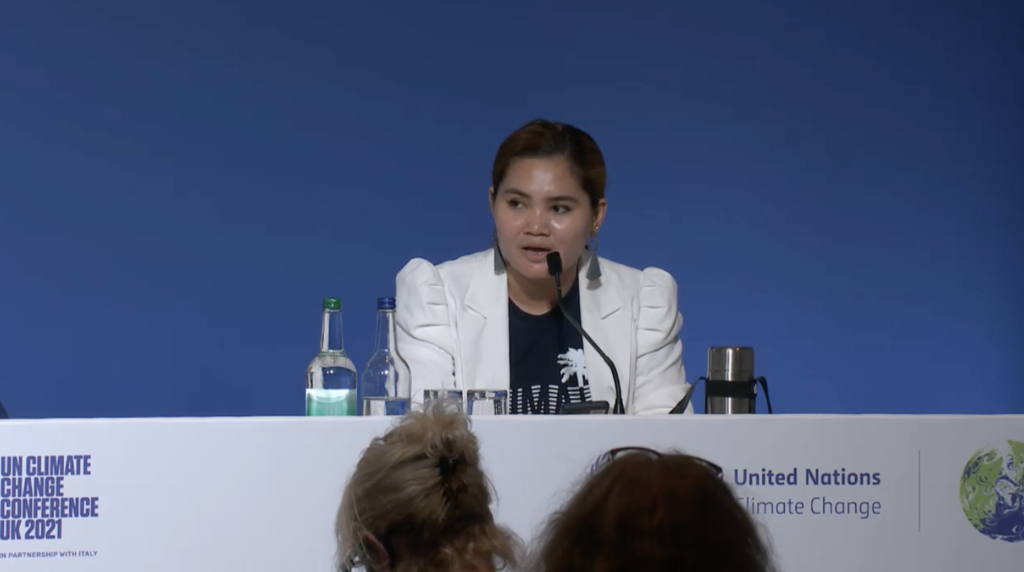It is time to deliver funding for Loss and Damage, say civil society speakers at COP26
8 November 2021

Loss and Damage needs to be a permanent agenda in all UN climate talks; On eighth anniversary of Typhoon Haiyan, speakers say testimonies from those impacted directly from climate disasters must be heard within negotiating rooms.
8 November, Glasgow: Today’s Climate Action Network media briefing heard from survivors of extreme weather events linked to climate change and calls for renewed efforts for loss and damage to have a greater focus within the ongoing UN climate talks here in Glasgow.
Six years after the Paris Agreement, little progress has been made on operationalising the Warsaw International Mechanism and ensuring support really reaches those in need. Developing countries are fighting for loss and damage to be included as a permanent agenda item in the COPs but attempts to discuss new and additional finance have been consistently dismissed by richer countries, the briefing heard.
Whilst the EU has a critical role to play in moving the issue forward, there also need to be support mechanisms, through loss and damage related packages, that include tangible, concrete processes flexible enough to match the needs of specific countries and the context of different disasters.
Sven Harmeling, international climate policy lead with CARE and CAN Europe, said: “We must move beyond where we were ten years ago and there needs to be a clear process and political commitment to explore new and additional finance streams before 2025 and to think about what happens beyond that. Without this COP26 cannot be labelled a successful response to climate injustice.”
Yamide Dagnet, Director, Climate Negotiations, World Resources Institute, added: “What we are trying to leave here with is a just and ambitious outcome. This does not consist of only keeping the 1.5C target alive but also being able to adapt and tackle the unavoidable losses and damages incurred increased warming.”
She went on to caution against a continuing ‘head in the sand’ approach to the issue at the UN climate talks.
“The ostrich policy from developed countries to hide behind liability and compensation has not, and will not, work. This is something that affects all of us and we need to pull together,” she added.
Marinel Ubaldo, Interim Secretariat, Aksyon Klima Pilipinas & Ecological Justice and Youth Officer of Living Laudato Si Philippines spoke as a survivor of Typhoon Haiyan which eight years ago today killed over 6,300 people causing nearly $3bn worth of damage. She called for action by world leaders to move loss and damage up the agenda.
Marinel said: “We should use COP26 as an opportunity to champion the loss and damage agenda, address social protection and seek risk management that averts loss of lives and assets and fights for financial accountability in the name of climate justice.
“Here we are eight years after Typhoon Haiyan and there are 1600 people still missing and we are still shouting for justice for our friends and families who have lost their lives because of the climatic disaster. We do not want to live in fear and we deserve a hopeful future.”
She said that they are still waiting for the publication of a report on major corporations’ responsibility for human rights disasters caused by their climate destructive operations and products.
Marinel added: “We believe this will set a historical precedent and will end the age of fossil fuels and more importantly, will give Philippines communities the much-needed hope in our fight for climate justice.”
Jo Dodds, President Bushfires Survivors for Climate Action, Australia, was impacted in 2019 when a bushfire swept through her region, destroying 3,000 homes and killing 400 people through smoke inhalation. Changing weather patterns have seen the bushfire season become a year-round event.
She spoke of Australia’s poor response to the fires and said that while many countries are talking the talk they need to walk the walk.
Jo said: “At least we are hearing the right things starting to be said from many countries, but not my own country, Australia. The country has seen so much damage from the fires and should be stepping up to assist those impacted but also support poorer countries facing impacts.
“Australia can and should be helping other developing countries who are not as wealthy but Australian leaders continue to silence those speaking out and calling for climate action. They want us to stay silent but we are here not to be silent.””The mental health implications of those experiencing repeated trauma from consecutive disasters cannot be underestimated,” she added.
########ENDS############

